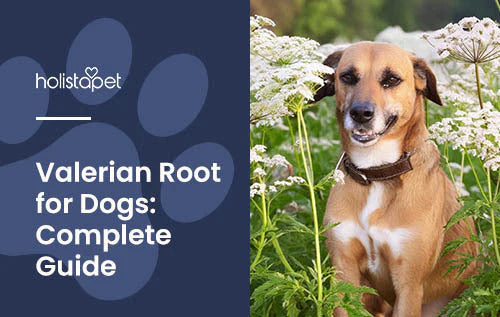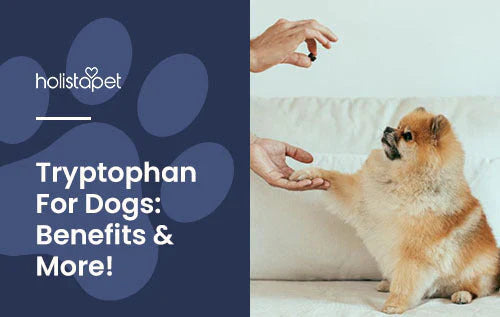If your furry friend is bouncing off the walls, valerian root for dogs can be your partner in creating a calmer canine companion. This herbal supplement offers a gentle solution for helping your furry friend deal with stressful situations. Naturally, many pet parents are turning to valerian root as a safer alternative to traditional medications.
People have valued the valerian plant (Valeriana officinalis) for its calming effects for centuries. In this guide, we'll teach you why it can also be valuable for your dog. Whether dealing with noise phobias or vet visits, this natural relaxant has calming properties and mild sedative qualities that can help manage stressors for your four-legged buddy.
What Is Valerian Root?
Valerian root comes from the valerian plant, known scientifically as Valeriana officinalis. Native to Europe and parts of Asia, this plant sports lovely pink flowers. People have used it in herbal medicine for thousands of years, often to help them relax or sleep better. What's cool is that it has similar uses for dogs, acting as a herbal supplement.
You can find valerian root at most pet supply stores and health food shops. Trained herbalists often recommend it as part of a holistic approach to pet care. The root itself has calming properties, which can be beneficial in relaxing dogs. It works by inducing a calming effect in canines, making coping with various stressors easier.
How Does Valerian Root Work?
Valerian root helps calm dogs by changing the way their brains handle feelings of worry and agitation. This herbal supplement influences the neurotransmitter gamma-aminobutyric acid (GABA), which helps control the nerves in the brain.
When the valerian plant boosts GABA, it helps block nerve transmissions that make canines anxious or too excited. This function is helpful for pups who get easily scared, for example, during long rides or loud events.
Additionally, this relaxant is a natural and gentle choice compared to stronger drugs. You can use valerian as often as needed or occasionally, depending on what your furry friend needs. It is, therefore, a great option for dog owners who want a natural way to help their furry pals stay calm and happy.

Is Valerian Root Safe for Dogs?
Valerian root is generally safe for dogs when used following the recommended dose. Many pet owners choose this herbal sedative as a natural way to help their dogs relax without resorting to stronger medications. However, using this supplement correctly and in the right dose is important to ensure it is safe for your pet.
Before starting any new supplement, you should talk with your dog's vet. The vet can advise based on your dog's health conditions and history. This consultation is especially important if your dog is already taking other medications since the supplement can sometimes interact with other meds.
What Are the Benefits of Valerian Root for Dogs?
Valerian root can be really helpful for canines, especially when they feel worried or can't relax. Here are the key benefits of using this herbal supplement for your pet:
- Calming Effects. It is great at helping pups stay calm during thunderstorms, fireworks, or isolation.
- Supports Quality Sleep. It has calming effects which may make it easier for your dog to fall asleep and sleep through the night.
- Helps With Hyperactivity and Restlessness. For highly active dogs that can’t seem to settle down, valerian root can help them relax.
Anxious Behaviors
Valerian root can make a big difference for pets who are nervous about many things. Think car rides, vet visits, or whenever they're alone at home. Here's how this calming herb can help them:
- Helps Calm Anxious Behaviors. Valerian root helps calm the mind, making dogs less likely to react negatively to stressors.
- May Ease Fears. This supplement can decrease the fear dogs feel in new or intimidating situations, like when you're hosting large groups of people at home.
- Promotes a Calmer Demeanor. Valerian root may help calm aggressive dogs, making them easier to manage.
Sleep
Valerian root has mild sedative qualities that encourage better sleep patterns. Here’s how it can benefit dogs at bedtime:
- Encourages Deeper Sleep. Valerian root helps dogs relax enough to fall into a deeper, more restful sleep.
- Helps Reduce Nighttime Activity. By promoting a calmer state, this sleep-enhancing herb can decrease dogs' pacing or movement during the night.
- Supports Overall Health. By improving sleep quality, this herb helps ensure that dogs are healthier and more energetic during the day.
Restlessness and Hyperactivity
Valerian root is also effective for managing restlessness and possibly hyperactivity in dogs. Here’s how it can help canines who are overly energetic or have difficulty settling down:
- May Ease Hyperactivity. It can help soothe dogs with endless energy and that struggle to relax.
- Promotes Relaxation. By reducing hyperactivity, it helps create a more relaxed environment.
- Aids in Training. Valerian root can sometimes stimulate activity in dogs, making them more alert during training sessions.
When Should I Give My Dog Valerian Root?
Valerian root is best used in scenarios where your pet might experience stress. Here are a few circumstances when this stress-relief herb can be particularly useful:
- Before Stressful Events. If you know there will be loud noises, giving valerian root beforehand can help your dog stay calm.
- For Routine Nervousness. Dogs that regularly feel nervous can use this herbal supplement to help make recurring events less stressful.
- At Night for Sleep Issues. If your dog has trouble settling down at night, using valerian root as part of their evening routine can help them relax and sleep better.
Visit the veterinary office before starting any new supplement regimen, especially if your dog has underlying health issues or is taking prescriptions. An integrative veterinarian can guide you on safely using valerian with other treatments.

How Do I Give My Dog Valerian Root?
Administering valerian root to your dog is straightforward, but knowing how to do it well is best. Here are some tips:
- Right Form. Valerian root can come in essential oil, capsule, or tablet forms. Choose the form that is easiest for you to administer and most acceptable to your dog. If you're looking for a powerful calming option that works, we offer Melatonin Soft Chews for Dogs containing quality valerian root.
- Right Dose. The amount of supplement your dog needs can vary based on size, age, and specific needs. Always start with a lower dose and consult your veterinarian to determine the right amount.
- Add to Dog's Diet. Mix this calming herb with your dog's food to help mask the flavor and make it more likely that your dog will consume the full dose.
- Consistent Timing. For ongoing issues like sleep problems or anxious behaviors, giving valerian root at consistent times each day can help maintain its effectiveness.
What Is the Suggested Dosage?
Using this supplement to calm dogs is not an exact science and may require some careful practice. The dosage can vary depending on the size of the dog and the specific reason for using the supplement. Here are some general guidelines to follow:
- Small Dogs. Start with small doses, such as a few milligrams per pound of body weight, and observe how your dog reacts.
- Medium to Large Dogs. Larger dogs can handle a higher dose, but's still important to begin with a conservative amount and adjust as needed.
- Consult Your Vet. Your vet can provide guidance based on your dog's specific health conditions and needs. Note that pregnant dogs should only use valerian root under the supervision of a vet.
Are There Any Side Effects of Valerian Root for Dogs?
While valerian root is generally safe for dogs when used appropriately, it can have potential side effects like any supplement. Here are some common side effects to watch for:
- Drowsiness. Increased drowsiness is one of the most common side effects of valerian root. It may be problematic during the day if the dog becomes too sedate.
- Upset Stomach. Some dogs might experience digestive issues, such as an upset stomach or diarrhea, especially if given too large a dose.
- Unusual Behavior. If your dog seems unusually sluggish or disoriented, it may be a sign to adjust the dosage.
Are There Any Drug Interactions I Should Watch For?
Valerian root can interact with other medications your dog may be taking. Therefore, it's important to be cautious and consult your vet. Here are some key points to consider regarding drug interactions:
- Sedatives. Combining sedatives or any medications that cause drowsiness with valerian root could enhance the relaxing effects and possibly lead to excessive sedation.
- Medications for Anxious Behaviors. It may also interact with medications prescribed for anxious behaviors, altering their effectiveness or leading to unpredictable side effects.
- Other Herbal Supplements. Some herbs can amplify the effects of valerian root or cause unwanted reactions.
It's crucial to inform your vet about all the medications and supplements your furry pal is currently taking. This way, your dog's vet can provide safe and informed recommendations, considering any underlying health issues.
Final Thoughts - Valerian Root for Dogs: Keeps Pets Peaceful
Valerian root, one of the key calming ingredients used in natural pet remedies, can be a great natural option for helping your dog feel calmer and sleep better. It's a useful tool for pet parents who want to improve their pets' lives, especially those prone to anxious behaviors or sleep issues.
With careful use and sound advice from your vet, valerian root can be a safe and helpful part of your dog's daily care. It's not a simple fix, but with the right management, it can significantly benefit your beloved furry family member.







![Probiotics For Dogs [Soft Chews] - HolistaPet](http://www.holistapet.com/cdn/shop/files/Probiotic-Infographic-1_472d7a29-e30c-435a-9638-1365d8c3a9f9.jpg?v=1725384841&width=104)



























Leave a comment
All comments are moderated before being published.
This site is protected by hCaptcha and the hCaptcha Privacy Policy and Terms of Service apply.